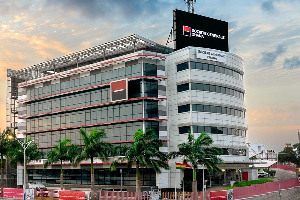Opinions of Tuesday, 18 September 2007
Columnist: Nelson, Nyadia Sulemana
Bui; Navigating a balance between Energy Provision and
Bui; Navigating a balance between Energy Provision and Indigenous Rights in Ghana.
Many Ghanaians were practically relieved when President J. A. Kufuor cut the sod for commencement of work on the Bui Hydro-energy project, which when complete will improve Ghana’s energy capacity requirement. However, few actually paused to give serious thought to the socio-cultural and economic implications of the project area, and the consequent need to address the immediate and future implications of the project. Reference to traditional people includes the people who inhabited the Bui environs before the modern state was born. Here, they will also be loosely referred as indigenous people or indigenous land owners. It is apparent that with the inception of the project, the Bui community will never be same again. But to what extent is the project protective of indigenous’ rights? Undoubtedly, peasant communities hold a pool of the countries natural resources. However they have suffered a consistent exploitation of the abundant natural assets to boost urban culture and industry with a corresponding neglect in development opportunities and benefits. This is the genesis of how society demonstrates gratefulness to rural communities which serve as a hub for natural resources.
There is also the critical issue of providing platforms for the consultation of indigenous inhabitants to solicit their fullest participation in development issues affecting them. Indeed, local people are thought of as beneficiaries of paternalistic charity who lack technical know-how on complex issues such as hydro energy and more. The need for consultation with them is therefore trivialised. Interestingly, media sensationalism has often created an unbalanced hype over otherwise critical debates resulting in indigenous-urban opinion clashes. The general view is that holders of natural assets who are predominantly rural dwellers are resentful of development. The absence of the free and meaningful participation and contributions of local peoples results in situations where national development objectives and policies demonstrate inconsistency with the views, aspirations and interests of local peoples affected by them. Past projects including the Akosombo and Kpong Dam projects which have had serious negative impacts on indigenous communities, including displacement, loss of livelihoods, destruction of local environments, damage to sacred sites underscore the lack of consultation with indigenous people. And from the perspective of indigenous inhabitants the absence of consultation has led to an intrusion of people into protected areas, unsustainable and unplanned influx of outsiders into traditional territories. There are unfolding stories of demand for compensation and reparation from evicted land owners and occupants from the Boankra Inland Port Project, Mole National Park, hydro dam projects, mines and quarries and many more. Scores of affected inhabitants therefore maintain chronicles of anguish over these indigenous rights violations waiting to exhale at similar provocations. Rural people are thus often wary of programmes offered in the name of development. The media is carrying reports of an early outcry of the Gonjas, Bandas and Mos affected by the Bui project for resettlement and reparation claims. You either take it now or never!
Why will implementors of government policy be so arrogant to indigenous rights to negotiate over their own resources? Advocates of cultural and indigenous rights need to drum home one fact. That the payments of reparation and resettlement packages are not a form of mortgage of a peoples land rights. Not even the building of a modern city could pay for the toil of the fallen heroes and heroines of the affected community whose discipline in the use of natural assets assisted to maintain a balance in the resources we seek to exploit for various gains today. The toil, discipline and sacrifice of the affected indigenous people now and in the past is monumental. And the peoples valuation of, and sense of spiritual connectivity with their resources is unquantifiable! The mentality of Marketisation and commercialisation of natural assets is unacceptable. Generations yet unborn must inherit a legacy of natural assets so that there is a testimony for their gratefulness to their ancestors.
Article (16) of ILO Convention 169 reiterates that where the “State retains the ownership of mineral or sub-surface resources or rights to other resources pertaining to lands” as established by Chapter 21 subsection 257(6) of the 1992 Constitution, “governments shall establish or maintain procedures through which they shall consult these peoples, with a view to ascertaining whether and to what degree their interests would be prejudiced, before undertaking or permitting any programmes for the exploration or exploitation of such resources pertaining to their lands. The peoples concerned shall wherever possible participate in the benefits of such activities, and shall receive fair compensation for any damages which they may sustain as a result of such activities." This provision should be upheld in future projects. In 1965, 80,000 farmers of the Volta River valley were forced to move from their lands because of the construction of the Akosombo Hydropower Dam, which flooded more land than any other dam in the world: 8,500 km2, almost 4% of the entire area of the country. The dam also set in motion waterborne diseases, especially bilharzia and malaria. Later on, between 1978 and 1981, the Kpong Dam displaced 6,000 people and despite assurances that the mistakes of Akosombo would not be repeated, the resettlement programme actually caused problems worse than those of Akosombo. So what assurance do peasant inhabitants have that Bui will be different?
This sharply brings to the fore the erosion of some of the powers of indigenous leadership and its accountability mechanisms. In particular, indigenous spiritualism has been demonised and reduced to ‘animism and paganism’ in its attempts to fit into the contemporary governance dispensation. It is therefore relegated to the background and only present in peasant communities. Again Article 267 (1) of the 1992 Constitution provides that all stool lands in Ghana be vested in the appropriate stool on behalf of, and in trust for the subjects of the stool in accordance with customary law and usage. While the institution of chieftaincy which is guaranteed by the 1992 Constitution of Ghana receives the blessings of both the indigenous and contemporary governance structures, there are gaps in the systems that articulate a collective failure of the two intersecting systems to address issues of accountability effectively. Noting that chiefs are the leadership representatives of their people, indications are that while some stool/skin occupants chart a development based leadership, many are far from being accountable. The loose structures of accountability affect the quality of consultation with chiefs and general information flows within the community hierarchy. This offers investors and developers a leeway to exploit communities and their resources. While this is not presumed to happen in the Bui project case, one finds room to ask questions as to whether consultation was exhaustively done with the affected communities. Did we negotiate with only chiefs exploiting the weak structures of communication and accountability to our advantage and ignoring community sentiments? Did we undertake wider inclusions with all affected people? How was this done?
Recognition of and respect for land and resources are fundamental to many indigenous belief systems. To this the United Nations Conference on Environment and Development calls upon intergovernmental organizations to establish a process that empowers indigenous people and their communities through a recognition of their lands, support for alternative environmentally sound means of production and arrangements to strengthen indigenous participation in the national formulation of policies, laws and programmes relating to resource management and development that may affect them. How much of this is observed in our case?
In a related context, successive governments are guilty of supplying power to neighbouring countries in the interest of good neighbourliness and economic factors when the indigenous inhabitants whose resources generate power languish in darkness and abject poverty. Embarrassingly, benefits of the power export never trickle down to them. So in all such projects governments never really offer priority to local peoples aspirations. But it is rather the interest of industry that is paramount.
While such projects might create economic and social redemption schemes and opportunities, such as the ‘Bui City Project’, it is also true that they serve as quarters for only workers and tourists. The new cities only emerge to introduce new norms into completely peasant villages and sew inequality between inhabitants and the arriving workers. We still remember vividly the eviction orders that led to the forceful removal of some indigenous settlers from their lands to give way to the construction of the Tema Port City. We also know the challenges of inequality in Tema today. They range from armed robbery, development of shanties, land grabbing to sanitation challenges. Is the creation of the Bui City not for political expediency to replicate Nkrumah’s lessons as was accomplished in the Tema port city project, so that Kufuor can leave another ‘city’ legacy in his name?
Did I hear another gimmick of job creation? Will the indigenous peoples’ traditional educational knowledge of the ecology, ancestral history, construction and food hygiene, etc match the project’s job requirements? Will the local people not need an average western style education qualification to enter the job positions? Does the Bui populace have the skill to fit into the requirement of a modern job market? Labourer! Sir, now I know the kinds of job positions been mentioned.
While not opposed to development policies that bring improvements nationally and locally, rural inhabitants who are marginalised in mainstream national policy debates are still not respected even in local policy issues whose ownership they should control. They therefore need to be empowered to join mainstream discourse so that they influence decisions that have an impact on their communities and rights. It is important that in seeking responses to the challenges of poverty, society does not trample on the rights of local inhabitants in the pursuit of growth and development. It is uninformed on the part of many top officials to hold the belief that rural communities have no understanding of key development issues affecting them. This perception is created by the low western educational attainment of peasant people. Such unjust claims also perpetrate poverty and establish mechanisms to suffocate their cultural identity and self determination.
It must be clear that accessing natural resources for hydro energy generation changes ownership and land use patterns and permanently takes land out of the reach of local people. Under such complex circumstances, the consultation processes should be done at very expansive and deeper levels. Consultation is never exhaustive until the various stakeholders who can influence project results and who sit on the fence are fully immersed into the project. Therefore consultation must be ongoing.
For the traditional people, issues of their territory and natural assets, health and education are among their most pressing aspirations. Land articulates a spiritual embodiment not just physical soil. Together education and health promote human development by advancing the socioeconomic and human wellbeing of peasants. Better still the indigenous spiritual phase of education and human wellbeing are even more imperative. They offer an integrated and interactive study of issues of hygiene, diseases, environment, food security, etc. Education and health issues are both based on a disciplined connection with the earth and its associated spirits. Bui and other peasant communities now live in twilight situation, caught between tradition and sometimes unsustainable change. Where will the earth priests site their deities in the new Bui city? So that they can establish a connecting ground to decorate their ancestors. Possible honours could be Companion of the Order of the Volta or Member of the Order of the Volta because they nurtured the Volta and its assets. We recognise that a people that do not recognise its past heroes are not worth dying for. Break the kola nut and pour libation in all high places! Observe an overnight vigil by a fire. Woman, sing the dirges! Our land is desecrated. Cleanse this land, tindana (earth priest). Let there be no drumming. Let each family sacrifice a fowl to declare their innocence in this conspiracy to evict our ancestors from their land. Let the firing of musketry be heard in all huts. Awake! our ancestors from slumberland. Now fathers of our fathers, fight this battle. Win the war! Find the equilibrium. Let our victory be heard in the high heavens!
We need to avoid paternalistic or externally conceived responses to our development challenges. They do not recognize the need to ensure the full, free, active and meaningful participation of indigenous peoples in the planning, implementation and evaluation of development policies, projects and decisions. They do not know our people and so owe them little, if any at all. But this is imperative if we are to recognize the potential value of indigenous contributions to such processes. This is more people based no matter whether they are urban or peasant in nature. The fundamental quest to respect various ethnic people’s rights to self-Identification, self-determination, consultation and participation, customs and traditions, land rights, human well-being and education must be upheld in all cases. Ghana is an epitome of good governance in the West Africa and must protect ethnic rights!
Let the talking drums spread this message to our people, the witches and witchdoctors alike that indigenous rights are human rights!













